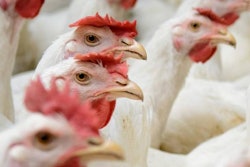
Only in Russia and Taiwan have new outbreaks of highly pathogenic avian influenza (HPAI) in poultry been officially reported in the last week, but a warning has been issued regarding the threat of the disease to human health.
In the last week, Russia’s Ministry of Agriculture has confirmed a further five outbreaks of HPAI of the H5 subtype in poultry to the global animal health agency, the World Organisation for Animal Health (OIE). The latest outbreaks were in small flocks described as “backyard,” ranging from 44 to 152 birds. Of the total of 445 poultry affected, 85 died and 117 are reported to have been destroyed.
Of concern is that the disease appears to have jumped to a new region, Smolensk. Although also in western Russia, this oblast is further east than the previously affected areas of Kursk, Penza, Samara, and Saratov.
Since the first cases were reported in mid-June, there have been 33 HPAI outbreaks in Russia, affecting almost 488,000 poultry.
Asia: HPAI outbreak in Taiwan, preventative measures in Iran
In Taiwan, a flock of 2,635 meat ducks in Yunlin has tested positive for the H5N2 HPAI virus. According to the official report to the OIE, this brings the number of outbreaks in the county so far this year to 42.
After nine outbreaks of HPAI linked to the H5N1 virus variant since December of last year, Cambodia’s agriculture ministry has declared the disease situation “resolved” to the OIE. The most recent cases were at a farm in mid-March.
Ten million doses of vaccine to combat HPAI in poultry have been imported into Iran over the last three weeks, reports Trend.
Although the spread of the H5N8 virus has been controlled in recent months, vaccination may now be necessary, according to the head of Iran’s veterinary organization for fighting bird flu.
Concerns over low-pathogenic avian flu virus in Indonesia
Low-pathogenic avian influenza (LPAI) viruses have been detected in poultry in Indonesia, reported the Jakarta Post last week.
A joint report from the national agriculture ministry and the Food and Agriculture Organization (FAO) records the detection of the H9N2 LPAI virus, according to the report.
While LPAI viruses do not lead to high mortality in the flock, this variant has been known to cause egg production drops of up to 70 percent.
The virus is already badly damaging farmers’ incomes, according to the ministry’s animal health director, and unlike the H5N1 HPAI virus that has affected the country is the past, there is currently no effective vaccine against this LPAI virus.
As well as causing egg drop in poultry, the H9N2 LPAI virus has the potential to impact human health. According the Avian Flu Diary, the internal genes of this virus form the basis of several HPAI virus types that pose the highest risk to the health of both poultry and people.
Africa: Further HPAI cases in Ghanaian poultry
Two more farms appear to have been infected with HPAI, reported Ghana Web last week.
Around 11,800 birds have been culled so far at three farms. Affected have been one farm in each of the states of Ashanti and Eastern, as well as a smaller flock in Tema, which is in Greater Accra Region.
The Minister of State for Agriculture said the first two facilities have been disinfected.
In 2016, more than 25,000 poultry were destroyed in 13 outbreaks of HPAI in Ghana, and more than 76,000 were lost to the disease the previous year.
















